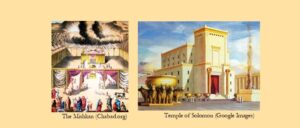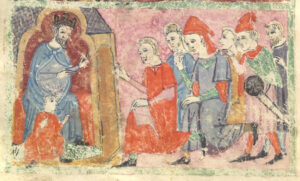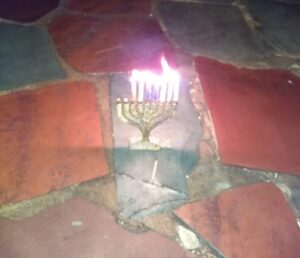 Ruach HaYam teaching presented by Penina Weinberg February 28 2021
Ruach HaYam teaching presented by Penina Weinberg February 28 2021
Building Mishkan vs Temple: Willing Heart vs Corvee Labor Feb 28 2021
 Ruach HaYam teaching presented by Penina Weinberg February 28 2021
Ruach HaYam teaching presented by Penina Weinberg February 28 2021

 Ruach HaYam teaching presented by Penina Weinberg February 28 2021
Ruach HaYam teaching presented by Penina Weinberg February 28 2021
 Ruach HaYam teaching presented by Penina Weinberg January 21, 2021
Ruach HaYam teaching presented by Penina Weinberg January 21, 2021
 Ruach HaYam teaching presented by Penina Weinber
Picture is a photo of a small hannukiah lit in the midst of a great cold wind on the cobblestone front porch of an empty house on a Maine beach on the 6th day of Hanukkah in 2019.
No, we’re not at Hanukkah yet, but we are at the Jewish calendar date 3 Kislev, the beginning of the month in which Hanukkah falls, and the darkest month of the year. We are two days after the new moon of Kislev. We can take hope in candles lit against the darkness. We are also at Parashat Toldot, Genesis 25:19-28:9, wherein Rebecca makes the most existential cry of the entire Torah, and Jacob and Esau fight against the gender roles assigned them at birth, reversing them with the support of the Divine and Rebecca. And we’re at Transgender Day of Remembrance. As Jill Hammer writes below, we are in a time of introspection and outward action. We’ll talk about the texts, about Judith and Rebecca, about gender roles, and about how to bring light into darkness.
Jill Hammer’s book The Jewish Book of Days: A Companion for All Seasons situates each day of the year in its season, quarter, phase, and part of nature. Jill writes this about Kislev, in ancient Israel:
“Once the new moon was announced, bonfires were lit in the hills above Jerusalem. Far-flung communities would see the bonfires and light their own, until all the Jewish communities knew that the new moon had come. As stars help a ship locate itself on the sea, the bonfires helped Jews locate themselves in time, joining them to the root consciousness of their people.
According to Rabbi Judah, the 1st of Kislev is the first day of winter in Israel (Babylonian Talmud, Bava Metzi’a 106b). We are close now to the darkest days of the year, and the new moon bonfires remind us of the Hanukkah candles growing each night. The flames teach that when the moon is dark, we can expect its face to shine again, and when the sunlight is dimming, soon it will begin to grow again. This is true also for us: The quiet of introspection can and should lead to outward action in the world.”
Penina Weinberg is an independent Hebrew bible scholar whose study and teaching focus on the intersection of power, politics and gender in the Hebrew Bible. She has run workshops for Nehirim and Keshet and has been teaching Hebrew bible for 10 years. She has written in Tikkun and HBI blog, and is the leader and founder of Ruach HaYam.
*** Ruach HaYam https://www.facebook.com/groups/Ruach.HaYam/ study sessions provide a queer Jewish look at text, and are welcoming to LGBTQ+ and allies, to any learning or faith background, to all bodies, and friendly to beginners***
Ruach HaYam teaching presented by Penina Weinber
Picture is a photo of a small hannukiah lit in the midst of a great cold wind on the cobblestone front porch of an empty house on a Maine beach on the 6th day of Hanukkah in 2019.
No, we’re not at Hanukkah yet, but we are at the Jewish calendar date 3 Kislev, the beginning of the month in which Hanukkah falls, and the darkest month of the year. We are two days after the new moon of Kislev. We can take hope in candles lit against the darkness. We are also at Parashat Toldot, Genesis 25:19-28:9, wherein Rebecca makes the most existential cry of the entire Torah, and Jacob and Esau fight against the gender roles assigned them at birth, reversing them with the support of the Divine and Rebecca. And we’re at Transgender Day of Remembrance. As Jill Hammer writes below, we are in a time of introspection and outward action. We’ll talk about the texts, about Judith and Rebecca, about gender roles, and about how to bring light into darkness.
Jill Hammer’s book The Jewish Book of Days: A Companion for All Seasons situates each day of the year in its season, quarter, phase, and part of nature. Jill writes this about Kislev, in ancient Israel:
“Once the new moon was announced, bonfires were lit in the hills above Jerusalem. Far-flung communities would see the bonfires and light their own, until all the Jewish communities knew that the new moon had come. As stars help a ship locate itself on the sea, the bonfires helped Jews locate themselves in time, joining them to the root consciousness of their people.
According to Rabbi Judah, the 1st of Kislev is the first day of winter in Israel (Babylonian Talmud, Bava Metzi’a 106b). We are close now to the darkest days of the year, and the new moon bonfires remind us of the Hanukkah candles growing each night. The flames teach that when the moon is dark, we can expect its face to shine again, and when the sunlight is dimming, soon it will begin to grow again. This is true also for us: The quiet of introspection can and should lead to outward action in the world.”
Penina Weinberg is an independent Hebrew bible scholar whose study and teaching focus on the intersection of power, politics and gender in the Hebrew Bible. She has run workshops for Nehirim and Keshet and has been teaching Hebrew bible for 10 years. She has written in Tikkun and HBI blog, and is the leader and founder of Ruach HaYam.
*** Ruach HaYam https://www.facebook.com/groups/Ruach.HaYam/ study sessions provide a queer Jewish look at text, and are welcoming to LGBTQ+ and allies, to any learning or faith background, to all bodies, and friendly to beginners***
Ruach HaYam Workshop at Congregation Eitz Chayim, 136 Magazine Street, Cambridge, MA – May 17, 2018. See end of post for logistics.
(Scroll to end for logistics)
Banner shows two woodcuts by Margaret Adams Parker. In both, Naomi and Ruth and villagers are portrayed as long robed and hard laboring – not the common idyllic scenes. First image shows Naomi entering her old village, drooping, supported by Ruth. Caption “Ruth 1:19 – And the women said, ‘Is this Naomi?'” Second image shows Naomi looking up at Ruth. Caption “Ruth 3:16 – And she said, ‘Who are you my daughter?'”
Join us for a timely discussion of the book of Ruth.
**Boundary Crossing**
What can we learn from Ruth and Naomi about transforming identities?
**Bitterness of Soul**
“Do not call me Naomi, call me Mara (bitter)” (Ruth 1:20-21). How is Naomi like Job?
**Chesed**
Chesed (loving kindness) wins the day. How does this work? Why does Ruth disappear in Chapter 4, leaving her child with Naomi?
Here is my source sheet.
Penina Weinberg is an independent Hebrew bible scholar whose study and teaching focus on the intersection of power, politics and gender in the Hebrew Bible. She has run workshops for Nehirim and Keshet and has been teaching Hebrew bible for 10 years. She has written in Tikkun and HBI blog, and is the leader and founder of Ruach HaYam.
** Logistics**
Study starts promptly at 7:15 pm. We open the doors at 6:45 for schmoozing. Feel free to bring your own veggie snack for the early part. A parking consideration is in effect for the three blocks around EC during all regularly scheduled events. It is a good idea to put a note in the windshield that you are attending an event at EC.
Accessibility information: all gender/accessible bathrooms, entry ramp.
Ruach HaYam study sessions provide a queer Jewish look at text, but are welcoming to any learning or faith background, to all bodies, and friendly to beginners.
This essay was first published on September 15, 2017 on the Hadassah-Brandeis Institute Blog
Ruach HaYam: Why We (Still) Need Queer Jewish Space
A few years ago I started a group in Boston aimed at providing space for LGBTQ Jews to gather for learning and worship in a way that would enable us to bring our full selves to the table. We named ourselves Ruach HaYam, Spirit of the Sea, after the sea surrounding us in Boston, and for the sea across which Miriam and Moses led the children of Israel. Ours was not a unique idea at the time, but as we are completing our fifth year at Ruach HaYam, I find it becoming harder, and therefore more essential, to find spiritual community dedicated to queer Jews. Continue reading
Parashat Vayikra, the first portion of the book of Leviticus, is foreign to our modern ears, with its rules for animal sacrifice, detailed requirements for what to do with each type of animal for different offerings, and rules about eating the fat and the blood. How can we understand this ritual? Nancy Jay [see sources at end of paper] points out that the way to understand ritual is not to try and find a meaning identical to the ritual actors, but to build a kind of bridge, “not to accurately decode their meaning, but to make what they do and say intelligible for us.” One way to do this is to consider that the ritual of sacrifice as presented in Leviticus some 2500 year ago is a method of creating a holy routine – instructions about how to bring holiness into our lives through sacred norms. As modern Jews, we don’t bring order through sacrifice, but we do bring order through our own ritual practices.
Although this seems like a satisfying meaning, there is a drawback. Continue reading
This article was written by Mischa Haider and Penina Weinberg and was first published in Tikkun Daily Blog on May 13th, 2016.
Image: Queen-Vashti-Refuses-to-Obey-the-Command-of-Ahasvuerus
The night after Purim the two of us sat feasting – a queer Hebrew bible scholar and a trans woman activist. The book of Esther was on our minds, as we read Esther every year on Purim, the festival when we celebrate the brave Jewish queen who saves her people from annihilation in Persia. Also on our minds was the “bathroom panic” gripping the nation over the perilous prospect of transgender women using women’s restrooms.
Ruach HaYam Workshop at Congregation Eitz Chayim, 136 Magazine Street, Cambridge, MA – April 19, 2018. See end of post for logistics.
Join us for a discussion led by Penina Weinberg about Joy Ladin’s Tikkun Magazine article (fall, 2014): “Both Wilderness and Promised Land: How Torah Grows When Read Through LGBTQ Eyes.” (We will have copies at the study session). This is by way of preparing us for Joy’s book, The Soul of the Stranger: Reading God and Torah from a Transgender Perspective, due out later in 2018 from Brandeis University Press. We hope to have an opportunity to learn with Joy at that time!
There is so much we can talk about from the article. In order to fully discuss it, and to see if we agree or disagree with Joy’s conclusions, we will look up and study many of the verses in Tanakh to which Joy refers.
There is considerable tension between queer creation and the establishment of sacred normativity. (PS, those of you who learned with Ezra Rose Greenfield , note the establishment of God’s **angelic** court.) Here is a taste of what Joy has written.
“The Torah’s God is disembodied, incomparable, and incomprehensible in human terms. Judaism, Christianity, and Islam developed theologies based on the God we encounter in the Torah, but by Iron Age standards, this God is utterly queer. Later Jewish traditions and texts normalize this queer God, imagining God as a king or emperor surrounded by an angelic court. But the God we encounter in the five books of Moses has no normalizing context, no divine hierarchy to define God’s kingship, no divine family for God to patriarchically dominate, no consort, and no body. As a result, despite the masculine pronouns and verb forms assigned by the text, God has no gender, masculine or otherwise, because God has no way to demonstrate or perform a gender. Gender is a system; even the simplest form of that system, the gender binary, requires at least two of a kind, and God, as Jews affirm in the Shema prayer, is One. And, as many of us know, being singular, living outside recognized human categories and relationships, makes one very queer indeed….. We are queer children of a queer God-and by ‘we,’ I mean the Jewish people. When queer Jews read Torah as our own, we help all Jews recognize and reclaim our heritage of radical queerness, rekindling the flame of desire that led our ancestors to abandon known norms and follow God through a wilderness unknown toward a future founded on the principle that being true to God requires being true to ourselves.”
Penina Weinberg is an independent Hebrew bible scholar whose study and teaching focus on the intersection of power, politics and gender in the Hebrew Bible. She has run workshops for Nehirim and Keshet and has been teaching Hebrew bible for 10 years. She has written in Tikkun and HBI blog, founded the group Ruach HaYam and is president emerita and webmaster at her synagogue. Penina is a mother and grandmother.
** Logistics**
Study starts promptly at 7:15 pm. We open the doors at 6:45 for schmoozing. Feel free to bring your own veggie snack for the early part. A parking consideration is in effect for the three blocks around EC during all regularly scheduled events. It is a good idea to put a note in the windshield that you are attending an event at EC.
Accessibility information: all gender/accessible bathrooms, entry ramp.
Ruach HaYam study sessions provide a queer Jewish look at text, but are welcoming to any learning or faith background, to all bodies, are friendly to beginners.
Ruach HaYam Facebook Subscribe to newsletter
Ruach HaYam Workshop at Congregation Eitz Chayim, 136 Magazine Street, Cambridge, MA – December 21, 2017. See end of post for logistics.
This study is led by Penina Weinberg.
Banner for event has a painting of an ecstatic person in red, possibly flaming, dress whirling in a blue wheel chair. Caption is
“Ezekiel’s vision split open my own imagination. Hearing those words chanted, I felt a jolt of recognition, an intimate familiarity. I thought: God has wheels!”
from “God on Wheels—Disability and Jewish Feminist Theology”
by Julia Watts Belser in Tikkun 2014
Illustration from the article: “Whirlwheel” by Olivia Wise. [end of caption]
Article can be found here via subscription or access through a library: http://www.tikkun.org/nextgen/god-on-wheels
Join us for an introduction by Penina Weinberg to the work of Julia Watts Belser on disability studies, and a relevant Talmud text study with Ruach HaYam member Ariel Cohen. Many of us wish for and hope for a world that will be accessible to all, and accepting of all. But there is much more. As Belser writes: “I fear that by conceptualizing disability primarily as an access problem to be solved, we fail to invite in the vibrant, transgressive potential of disability culture: of a ‘crip’ sensibility that celebrates disability as a way of life, a radically different way of moving through the world.” The notion of celebrating a vibrant and transrgessive culture will be familiar to queer Jews who wish to participate in celebration, not just tolerance.
Julia Watts Belser, whose work we will read, is an Associate Professor of Jewish Studies in the Theology Department at Georgetown University, with expertise in rabbinic literature and Jewish feminist ethics, with a focus on gender, sexuality, and disability studies. She is the author of Power, Ethics and Ecology in Jewish Late Antiquity: Rabbinic Responses to Drought and Disaster (Cambridge University Press, 2015) and Rabbinic Tales of Destruction: Gender, Sex, and Disability in the Ruins of Jerusalem (Oxford UniversityBar Press, 2017).
Barb Ariel Cohen is the Chief Scientific Officer of Arex Life Sciences, a biotech startup enabling physicians to more successfully treat male infertility. Ariel has been studying for the past 20 years with her rebbe Rabbi Alan Ullman, including a small private study group which he took to Israel.
Penina Weinberg is an independent Hebrew bible scholar whose study and teaching focus on the intersection of power, politics and gender in the Hebrew Bible. She has run workshops for Nehirim and Keshet and has been teaching Hebrew bible for 10 years. She has written in Tikkun, founded the group Ruach HaYam and is president emerita and webmaster at her synagogue. Penina is a mother and grandmother.